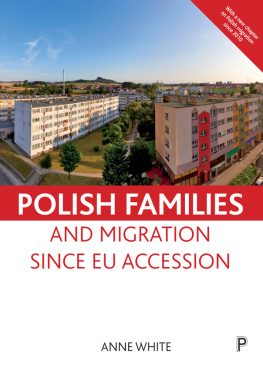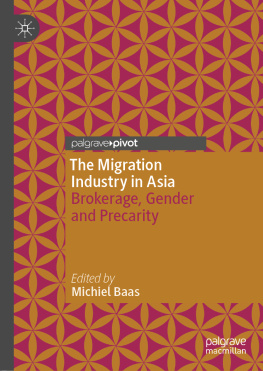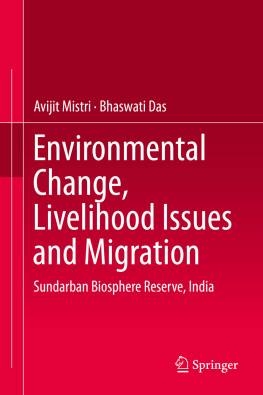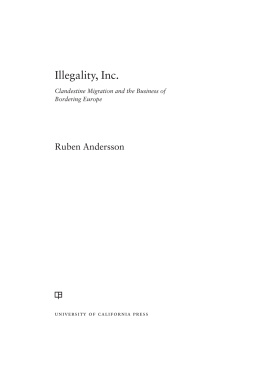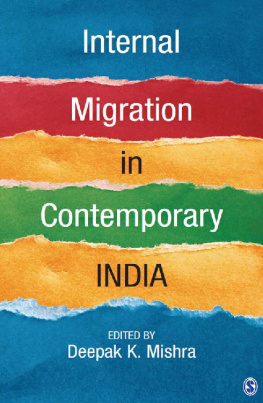Based on first rate ethnographic research, Jill Alpes illuminates how young Africans attempt to migrate at all costs. By pinpointing the paradoxes between mobility and control, the book provides fresh insights into how clandestine migration manifests itself in ways more complex than indicated in conventional human trafficking and smuggling literature.
Ninna Nyberg Srensen, Danish Institute of International Studies, Copenhagen
By standing still at the cleavage between how people prepare for migration and how receiving states regulate migration before it takes place, Alpes offers us a new vision of mobility and sets an example of how migration can be fruitfully examined by focusing on brokers, consulate officers and citizens in the global South. Ethnographically vivid and analytically insightful, this is a very timely and powerful book.
Biao Xiang, University of Oxford, UK
Brokering High-Risk Migration and Illegality in West Africa
Do young West Africans want to go abroad at any cost because they receive too little or erroneous information? Why do they and their families risk large sums of money with migration brokers? How do the risks of illegality and deportation change migration aspirations in West Africa?
This book places trafficking and smuggling within a wider framework of high-risk migration and proposes a novel interpretation of how people manage unwanted and uncertain migration outcomes. Drawing on in-depth ethnographic research with aspiring and failed migrants, their families, migration brokers and consulate offices in anglophone Cameroon, the author analyses high-risk migration from the vantage point of people in a place of departure.
Brokering High-Risk Migration and Illegality in West Africa: Abroad at Any Cost develops a critical socio-legal approach to the governance of migration that sees the state without seeing like the state. The states monopoly over legitimate means of mobility is continuously in the making frequently through accusations of fraud and criminality. By revealing how authority, legality and legitimacy operate in a country of origin, the analysis contributes original insights into processes that create the conditions for illegality and migrant exploitation. The book will appeal to those in the fields of migration and development, African studies, gender, anthropology, sociology, criminology and law.
Maybritt Jill Alpes is a research fellow at the Vrije Universiteit Amsterdam, senior policy officer at Amnesty International and invited researcher at the CERI Sciences Po Paris. She has worked and lived in Asia and Africa and has collaborated with international agencies, such as the OHCHR and UNESCO. She serves as resource person for the Post-Deportation Monitoring Network.
Studies in Migration and Diaspora
Series Editor: Anne J. Kershen,
Queen Mary University of London, UK
Studies in Migration and Diaspora is a series designed to showcase the interdisciplinary and multidisciplinary nature of research in this important field. Volumes in the series cover local, national and global issues and engage with both historical and contemporary events. The books will appeal to scholars, students and all those engaged in the study of migration and diaspora. Amongst the topics covered are minority ethnic relations, transnational movements and the cultural, social and political implications of moving from over there to over here.
Racialised Gang Rape and the Reinforcement of Dominant Order
Discourses of Gender, Race and Nation
Kiran Kaur Grewal
Brokering High-Risk Migration and Illegality in West Africa
Abroad at Any Cost
Maybritt Jill Alpes
Making Homes in Diasporic Communities
Transnational Belonging amongst Filipina Migrants
Diane Sabenacio Nititham
From the Arab Other to the Israeli Self
Palestinian Culture in the Making of Israeli National Identity
Yonatan Mendel and Ronald Ranta
Family, Citizenship and Islam
The Changing Experiences of Migrant Women Ageing in London
Nilufar Ahmed
Global Nomads and Extreme Mobilities
Pivi Kannisto
For the full range of titles please visit www.routledge.com/Studies-in-Migration-and-Diaspora/book-series/ASHSER1049.
Brokering High-Risk Migration and Illegality in West Africa
Abroad at Any Cost
Maybritt Jill Alpes
First published 2017
by Routledge
2 Park Square, Milton Park, Abingdon, Oxon OX14 4RN
and by Routledge
711 Third Avenue, New York, NY 10017
Routledge is an imprint of the Taylor & Francis Group, an informa business
2017 Maybritt Jill Alpes
The right of Maybritt Jill Alpes to be identified as author of this work has been asserted by her in accordance with sections 77 and 78 of the Copyright, Designs and Patents Act 1988.
All rights reserved. No part of this book may be reprinted or reproduced or utilised in any form or by any electronic, mechanical, or other means, now known or hereafter invented, including photocopying and recording, or in any information storage or retrieval system, without permission in writing from the publishers.
Trademark notice: Product or corporate names may be trademarks or registered trademarks, and are used only for identification and explanation without intent to infringe.
British Library Cataloguing in Publication Data
A catalogue record for this book is available from the British Library
Library of Congress Cataloguing in Publication Data
Names: Alpes, Maybritt Jill, author.
Title: Brokering high-risk migration and illegality in West Africa : abroad at any cost / Maybritt Jill Alpes.
Description: New York, NY : Routledge, 2016. | Series: Studies in migration
and diaspora | Includes bibliographical references and index.
Identifiers: LCCN 2016022517 | ISBN 9781472441119 |
ISBN 9781315565439 (ebook)
Subjects: LCSH: CameroonEmigration and immigration. |
Human smugglingCameroon.
Classification: LCC JV9018 .A56 2016 | DDC 364.1/37096711dc23
LC record available at https://lccn.loc.gov/2016022517
ISBN: 978-1-4724-4111-9 (hbk)
ISBN: 978-1-315-56543-9 (ebk)
Typeset in Times New Roman
by Out of House Publishing
Contents
Figures
Graphs
All photos were taken by the author.
Foreword by Biao Xiang
Why do young Africans want to migrate despite high risks? This question has bothered migrant-receiving countries, particularly those in Europe, since the 1990s. Recent events such as the 2015 Mediterranean migration crisis make it ever more pressing. The answer, as implied in this wonderful book based on prolonged ethnographic research in anglophone Cameroon, is simple. Young Africans migrate at high cost for the same reasons they want to migrate, just as people invest in business despite failures. (For many in the Third World, investing in migration is a safer bet than many other endeavours.)
The European question is also a genuine one, though. What they are really asking is: why do the Africans try to migrate despite high risks? Why dont they follow proper procedures, which are safe and easy? For most young Africans, however, proper procedures can lead only to a dead end. Risks in migration are not caused by how they migrate, but are pre-given if they want to migrate at all. Risks are not to be avoided, but have to be confronted and overcome. Migration is a process of fighting odds. Anyone says white men countries are no good is a witch a young Cameroonian told Alpes because these people want to spoil others migration projects, and anyone who talks about the danger of migration is jealous. This, if taken as a comment on receiving countries, is, unfortunately, a precise one. Behind the Migration is dangerous! message, as highlighted in the information campaigns by the International Organization for Migration and by national governments in the global North, is the campaigners fear of immigration. They are jealously guarding their cookie jars.



